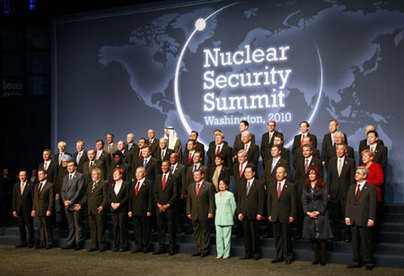为期两天的核安全峰会于当地时间本周二在美国首都华盛顿落幕,与会的47国领导人共同签署了公报及工作计划,呼吁国际社会在4年内确保所有易流失核材料的安全。公报说,核恐怖主义是对国际安全最具挑战性的威胁之一,强有力的核安全措施是防止恐怖分子、犯罪分子及其他非授权行为者获取核材料的最有效途径。根据峰会通过的工作计划,与会各国将在自愿基础上,根据本国法律和国际义务,在核材料的储存、使用、运输和处理的各个方面以及防止非国家行为者获取、恶意使用核材料所需的信息方面,实施相关的政治承诺。

 |
|
The leaders of the international delegations pose for a group photo at the Nuclear Security Summit 2010 in Washington, April 13, 2010. (Agencies) |
The two-day Nuclear Security Summit ended Tuesday, with leaders from 47 nations signing off on a non-binding communique and an action plan that presses for collective global action to secure all vulnerable fissile materials such as highly enriched uranium and separated plutonium within four years.
"Nuclear terrorism is one of the most challenging threats to international security, and strong nuclear security measures are the most effective means to prevent terrorists, criminals or other unauthorized actors from acquiring nuclear materials," said the joint communique adopted at the end of the summit.
The communique reaffirmed the fundamental responsibility of states, consistent with their respective international obligations, to maintain effective security of all nuclear materials, which includes materials used in nuclear weapons and nuclear facilities under their control.
The joint document puts the onus on nations to prevent non-state actors from obtaining the information and technology required to use such materials for making bombs.
Other pledges adopted at the summit include setting up of robust national legislative and regulatory frameworks for nuclear security; taking concrete measures to secure the safety of highly enriched uranium and separated plutonium; and expanding capacity building for atomic security at bilateral, regional and multilateral levels for the promotion of nuclear security culture.
The non-binding document also called for greater sharing of information and expertise relating to nuclear security.
The communique and action plan stressed the need for capacity building for nuclear security and cooperation at multiple levels for the promotion of nuclear security culture through technology development, human resource development, education, and training.
The joint document reaffirmed the essential role of the International Atomic Energy Agency (IAEA) in the international nuclear security framework and agreed to ensure that it continues to have the appropriate structure, resources and expertise needed to carry out its mandated nuclear security activities.
相关阅读
(Agencies)

Vocabulary:
vulnerable fissile materials: 易流失核材料
(中国日报网英语点津 Helen 编辑)